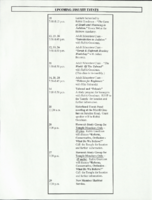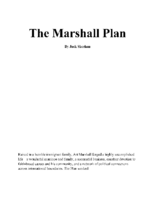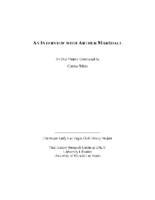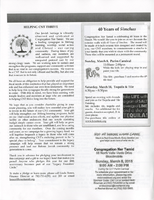Search the Special Collections and Archives Portal
Search Results

Minutes from Temple Beth Sholom Board of Directors meetings, 1998
Date
Archival Collection
Description
Meeting minutes include reports from committees of the board, correspondence, and balance sheets.
Text

Book, The Marshall Plan, by Jack Sheehan, 2013
Date
Description
Art Marshall is one of the founders of the Marshall-Rousso chain of women's dress shops that started in casinos in Las Vegas. He is also a banker, a member of the Nevada Gaming Commission, is active in the Anti-Defamation League and the Jewish Federation of Las Vegas, is an art collector, and is a philanthopist, especially for Jewish faith-based causes and for the University of Nevada, Las Vegas.
Text

Transcript of interview with Lynn Leshgold Rosencrantz by Barbara Tabach, January 7, 2016
Date
Archival Collection
Description
In this interview, Rosencrantz discusses at length her involvement as a founder of the city?s Jewish Federation?s Young Leadership Program, including other local leaders she worked with to promote Jewish community engagement in Las Vegas. She also talks about her spiritual journey as an adult, leading to her participation at Stillpoint Center for Spiritual Development.
Text

Transcript of interview with Laura Sussman and Wendy Kraft by Barbara Tabach, February 17, 2016
Date
Archival Collection
Description
They've been referred to as the two Jewish mothers who own a funeral home. At first glance that seems too simple a description. However, it is how they arrived at this description that tells a story of two women who moved here in the late 1990s and whose paths crossed as they became part of the Jewish community of Las Vegas. Laura Sussman arrived first. It was 1997. The Jewish Community Center, a JCC without walls as Laura puts it, hired her as its first executive director. She was from Ohio where there was a robust Jewish tradition. She was director for eight years; then executive director at Temple Beth Sholom. Wendy Kraft moved to the valley in 1999. She was a stay at home mom from Boston, who was accustom to volunteering in the Jewish community. Knowing no one and on the brink of divorce, the Jewish community became her life, a way to build a network of friends and keep her occupied just as it had been in Boston. The two women met through their work with the JCC and love followed. Several years later, in 2009, so did their new business, Kraft-Sussman Funeral and Cremation services. By February 6, 2015, Laura and Wendy had married. They had already formed a family with each other and their three daughters, Leah Sussman, Emma and Elyse Kraft. In this interview they discuss their joint sense of purpose that includes love of family, dedication to the Jewish community, pride in the LGBT identity, and providing caring services to those at the time of funeral services. They talk also of Jewish traditions related to death, the Jewish burial society known as Chevra Kadisha, and challenges of their industry. They share feelings about nonprofits and how they value being actively involved in the community.
Text

Transcript of interview with Jerry Engel by Barbara Tabach, March 1, 2016
Date
Archival Collection
Description
Jerry Engel was born in 1930 in New Jersey and spent most of his early life in Long Beach, New York until the family moved westward to Las Angeles. Jerry is a retired Certified Public Accountant and loves to talk about the history of Las Vegas that he observed since arriving in 1953. That was the year that he moved to Las Vegas to join his older brothers, Morris and Phil, in their accounting firm. Their major client at the time was Desert Inn. Another personal connection with local history: the Engel brothers? mother, Esther Katz Engel, was among the early investors in the Moulin Rouge hotel/casino enterprise. Jerry graduated with honors from University of California, Los Angeles in 1951. His accounting career in Las Vegas is highly regarded and he continues to maintain a consulting practice. He remains active within the community and enjoys doing presentations based on his memories of Las Vegas history. Within this interview, Jerry highlights people, casinos and other observations of local history that he came into contact with over the decades. He provides insights about the role of an accountant in the gaming industry. He also discusses the influence of Jewish business leaders in and array of local gaming and non-gaming issues, including the retail world, Jim Crow era segregation, and the astonishing growth of the valley over six decades.
Text

Transcript of interview with Arthur "Art" Marshall by Claytee D. White, February 11, 2014
Date
Archival Collection
Description
Interview with Arthur "Art" Marshall by Claytee White on February 11, 2014. In this interview, Marshall
Arthur Marshall was born in 1929 in Cleveland, Ohio. He met his wife, Jayn in 1953, and the couple moved to Las Vegas where she already lived with her family. Art joined his father-in-law in the family's retail clothing business. Art Marshall took over the retail clothing business with his brother-in-law, Herb Rousso, and expanded operations as Marshall-Rousso stores. Art quickly became very active in the Jewish community upon arriving in Las Vegas. He served as president at Temple Beth Sholom, and worked with other Jews in the city, many who owned and managed the hotels at the time, to build a strong Jewish community in Las Vegas. He served as the chairman of Nevada State Bank and spent 12 years on the Nevada Gaming Commission.
Text

Transcript of interview with Burton Cohen by Claytee White, January 9, 2009
Date
Archival Collection
Description
In this interview, Burton Cohen discusses his involvement in the Las Vegas casino industry, including booking entertainment for various hotels.
Burton Cohen's long casino executive career began in the mid-1960s when he accepted a proposition to become involved with the transformation of the Frontier Hotel. He left his south Florida roots and law practice to become a co-owner/general manager of the Frontier Hotel. Thus, began his highly regarded Las Vegas presence. For nearly four decades he served in the management of some of the Strip's most famous casinos: Flamingo, Dunes, Circus Circus, Caesar Palace, Thunderbird and the Desert Inn, which remains his favorite. In this interview, Burt reflects on the positions he held, the celebrities he hired and befriended, and offers a unique look at the behind the scenes marketing and entertainment strategies that he helmed. He shares stories of becoming entrenched in casino operations, his reflections of union experiences, and even anecdotes about moving his mother to Las Vegas.
Text

Transcript of interview with Henry Kronberg by Barbara Tabach, February 26, 2015 and April 13, 2015
Date
Archival Collection
Description
Interview with Henry Kronberg by Barbara Tabach in two sessions, February 26 and April 13, 2015. In the first session Kronberg talks about his childhood in Germany and Poland and his experience being imprisoned by the Gestapo, and transported to a concentration camp. He survived the Holocaust and met his wife, and they moved to the United States in 1946. He discusses being reunited with his sister in Las Vegas after decades of searching, and moved his family to Las Vegas in 1962. Kronberg talks about becoming involved with Jewish life here, and his wife, Lillian's involvement at Temple Beth Sholom. In the second session, Kronberg discusses purchasing Stoney's, a loan and pawn shop, including some of the clientele and merchandise. He also discusses other social and environmental concerns like anti-Semitism and water resources in Southern Nevada.
Henry Kronberg was born in 1920 and spent his early childhood in a town on the border of Poland and Germany, about 40 miles from Krakow. For years he felt uncomfortable telling his story of surviving the Nazi concentration camps of World War II. Today his name is linked to the Sperling Kronberg Mack Holocaust Resource Center in Las Vegas. And in his soft-spoken manner, Henry recalls his ordeal of loss of family and survival during this most heinous of situations through backbreaking labor and ingenuity. At the end of the war, Henry met the love of his life, Lillian, also a survivor. The two married in 1946 in Frankfurt and immigrated to New Jersey where she had relatives. He describes their difficulties and the various jobs he held until becoming an excellent baker. Then in 1962 an interesting choice took him to a bar mitzvah in Canada. While there the dinner conversation lead him to a great discovery?his sister Lala had survived and was living in Las Vegas. Soon he moved his wife and daughter to Las Vegas. His first foray into business was with his brother-in-law. However, soon it was important to be independent and to control his own destiny. He purchased a going concern, Stoney's Pawn Shop, from Dr. Alexander Coblentz, one of the city's first doctors. He became the fourth owner of Stoney's and operated it until selling it to Steven Mack in 1998. Henry and his wife were active in the Jewish community. They joined Temple Beth Sholom and became fast friends with many of the early leaders of Las Vegas and became a respected member of the secular and Jewish communities.
Text

Newsletter from Congregation Ner Tamid, March 2015
Date
Archival Collection
Description
Newsletter from Congregation Ner Tamid, March 2015
Text

Transcript of interview with Bernie and Barbara Kaufman by Barbara Tabach, October 27, 2014
Date
Archival Collection
Description
Bernard ?Bernie? Kaufman and Barbara (Raben) Kaufman were married in 1961 in their childhood home of St. Louis, Missouri, at the ages of twenty-one and nineteen respectively. In 1968, they moved to Las Vegas, joining Bernie?s brother, Herb, in the growing city who had opened the first store. Bernie assisted in managing the family businesses four stores, until they were sold in 1982. At that time, he went into the car rental business; he sold that business in 2000 and then went into airport advertising. Barbara focused herself on raising their children, Carrie and Andrew, and once the children were in their teens, she went to work for her brother as a bookkeeper. In this interview, the Kaufman?s reflect upon their upbringing in St. Louis, where they met and married, and making the decision to move to Las Vegas. They discuss the experience of running the stores and the impact on business as the retail environment changed over the years. The Kaufmans also talk about their involvement with the Jewish community, including B?nai B?rith and Sisterhood, and how it?s grown over the years. They also discuss the impact of the Jewish community members in gaming as well as other sectors, and the increase of congregations over the decades.
Text
